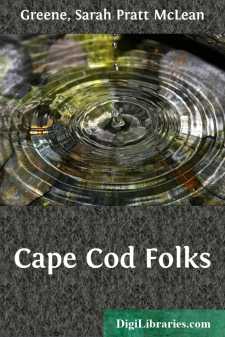Categories
- Antiques & Collectibles 13
- Architecture 36
- Art 48
- Bibles 22
- Biography & Autobiography 813
- Body, Mind & Spirit 142
- Business & Economics 28
- Children's Books 17
- Children's Fiction 14
- Computers 4
- Cooking 94
- Crafts & Hobbies 4
- Drama 346
- Education 46
- Family & Relationships 57
- Fiction 11829
- Games 19
- Gardening 17
- Health & Fitness 34
- History 1377
- House & Home 1
- Humor 147
- Juvenile Fiction 1873
- Juvenile Nonfiction 202
- Language Arts & Disciplines 88
- Law 16
- Literary Collections 686
- Literary Criticism 179
- Mathematics 13
- Medical 41
- Music 40
- Nature 179
- Non-Classifiable 1768
- Performing Arts 7
- Periodicals 1453
- Philosophy 64
- Photography 2
- Poetry 896
- Political Science 203
- Psychology 42
- Reference 154
- Religion 513
- Science 126
- Self-Help 84
- Social Science 81
- Sports & Recreation 34
- Study Aids 3
- Technology & Engineering 59
- Transportation 23
- Travel 463
- True Crime 29
Cape Cod Folks
Description:
Excerpt
ON A MISSION.
"Lo, on a narrer neck o' land,'Twixt two unbounded seas, I stand!"
Aunt Sibylla was not sporting, now, in the airy realms of metaphor. Aunt Sibylla stood upon Cape Cod, and her voice rang out with that peculiar sweep and power which the presence of a dread reality alone can give. Something of the precariousness of her situation, too, was expressed in The wild, alarming, though graceful, gesture of her arms.
It was before the long-projected canal separating Cape Cod from the mainland had been put under active process of preparation.
It was at an evening meeting in the Wallencamp school-house. A row of dingy, smoking lanterns had been set against the wall and afforded the only light cast upon the scene. Aunt Sibylla Cradlebow, the speaker, was tall and dark-eyed, with an almost superhuman litheness of body, and a weird, beautiful face.
"And, oh, my dear brothers and sisters and onconvarted friends!" she continued; "how little do we realize the reskiness of our situwation here on the Cape! Here we stand with them ar identical unbounded seas a rollin' up on ary side of us! the world a pintin' at us as them that should be always ready, with our lamps trimmed and burnin'! and, yit, oh my dear brothers and sisters and onconvarted friends! as fur as I have been inland—and I have been a consid'able ways inland, as you all know, whar it would seem no more than nateral that folks should settle down kind o' safe and easy on a dry land univarse—I say, as fur as I have been inland, I never see sech keeryins on and carnal works, sech keerlessness for the present and onconsarn for the futur', as I have amongst the benighted critturs who stand before me this evenin', a straddlin' this poor, old, Godforsaken Pot Hook!"
Clearer and louder grew Aunt Sibylla's tones; her eyes lightened with terrible meaning; her words flowed with an unction that was unmistakable; and, at length, "Oh, run for the Ark, ye poor, lost sinners," she exclaimed. "Oh, run for the Ark, my onconvarted friends! Don't ye hear the waves a comin' in? They're a rollin' swift and sure! They're a rollin' in sure as death! Run for the Ark! Run for the Ark!"
Now, there was in Wallencamp a literal Ark, otherwise this exhortation would have lacked its most convincing force and significance. But Aunt Sibylla paused. Among the usually restless audience, there was a moment of almost breathless suspense. Not half a mile away, behind a strip of cedar woods, we could plainly hear the surf rolling in from the bay, breaking hard against the shore with its awful, monotonous moan, moan, moan.
My heart was already faint with home-sickness. The effect of that waiting moment was as sombre as anything I had ever experienced. Much to my distaste, I found myself sympathizing with the vague terror and unrest around me. I can hear it still, the voice that then rose, singing, through the sullen gloom of the school-room, a strangely sweet and rapturous voice—Madeline's. I learned to know it well afterwards. I listened with rapt surprise to the pathos with which it thrilled the simple words of the song:—
"Shall we meet beyond the River,Where the surges cease to roll,
Where, in all the bright forever,
Sorrow ne'er shall press the soul?"
A keenly responsive chord had been touched in the simple, agitated breasts of the Wallencampers, and they joined in the chorus—those rough people—not with their usual reckless exuberance of tone, but plaintively, tremblingly even, as though, whatever the words, they would make of them a prayer in which to hide some secret doubt or longing of their souls....



